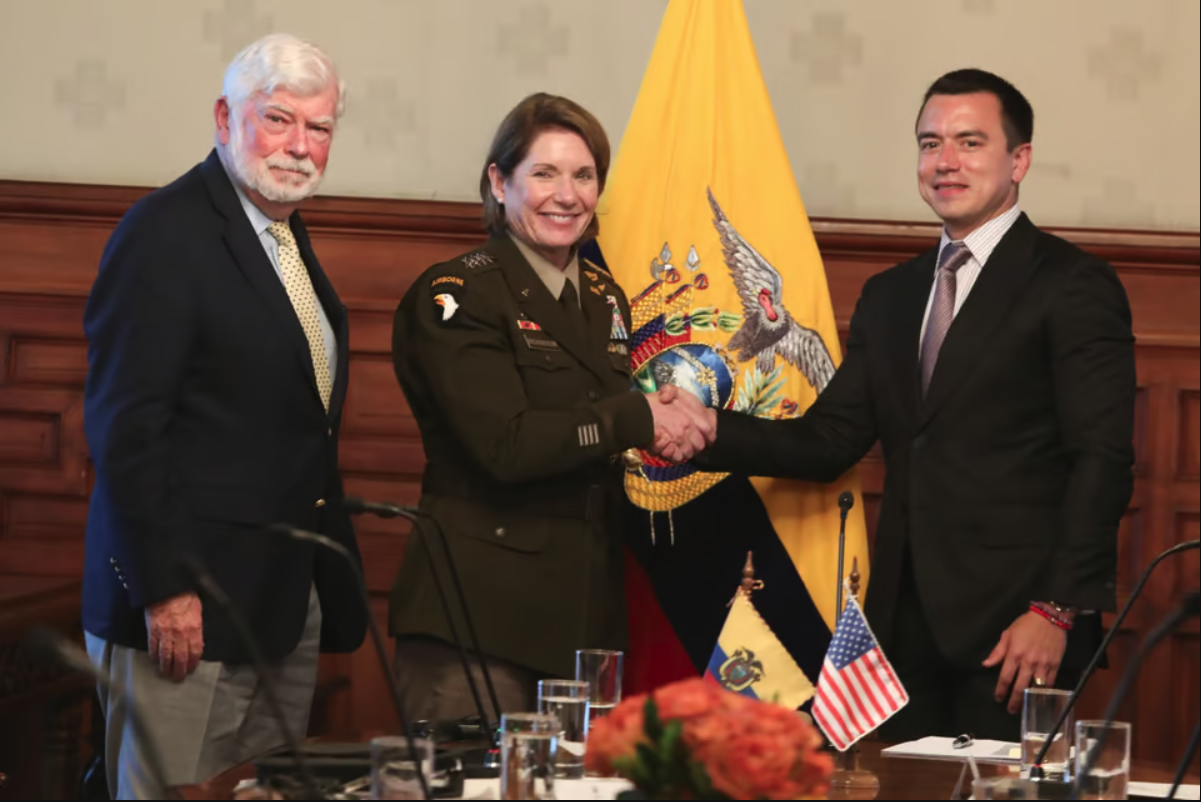
Published 01/24/2024 20:17 | Edited 01/25/2024 07:51
A new dynamic emerges in Ecuador with the recent agreement between President Daniel Noboa and the United States, addressing issues ranging from combating crime to investments and immigration treatment. The President of Ecuador, Daniel Noboa, received this Monday (22), the US special envoy for the Americas, Christopher Dodd, and the Commander of the Southern Command, Laura Richardson at the Carondelet Palace, headquarters of the country’s government.
At the meeting, which was also attended by Ecuadorian Chancellor Gabriela Sommerfeld and security ministers, the countries reached an agreement to increase cooperation in security and defense. She said the Noboa government has asked for more access to the North American market for its goods and services to contribute to an environment that attracts investment and job creation to Ecuador.
International analyst and political scientist Ana Prestes analyzes this development in an interview with Red Portal. Ana is also Secretary of International Relations at PCdoB.

She emphasizes that the agreement with the United States represents a new dynamic in Ecuadorian politics, especially after the recent crisis. The proposal aims not only to combat drug trafficking, but also to establish investments and cooperation on migration issues. “The United States behaves similarly to what it does here with Guyana as well. To face military cooperation, but with geopolitical interests”, he compares.
However, the controversy arises amid the assessment that Ecuador was “turning its back on the continent” by seeking support from the US, while other neighboring nations offered support. Especially considering that Ecuador received support proposals from Brazil, Colombia and Venezuela, without any progress in partnerships.
She emphasized that the indigenous leader, Leonidas Iza, expressed concern about the agreement reached by Noboa. “The main indigenous leader today in Ecuador, Leonidas Iza, who is from the Confederation of Indigenous Nationalities of Ecuador (CONAIE), he said yesterday that Daniel Noboa is taking advantage of this painful moment for the Ecuadorian people to cede sovereignty to the North American power. That’s exactly the spirit.”
Ana highlighted that the United States has lost influence in South America with recent political changes, and the agreement with Ecuador could be a strategy to contain the influence of countries like Venezuela and Colombia, especially after significant changes in these political scenarios.
“Guilherme Lasso already had better relations with the United States than with its neighbors on the continent. And Noboa is even more familiar, as he lived and studied in the USA.”
Ana highlights that rapprochement with the United States can be seen as a strategy to prevent the influence of Venezuela or Colombia, under the presidency of Gustavo Petro, in the region. The defeat of Uribismo in Colombia and Petro’s victory would have changed the presence of the United States in South America.
Marketing
Noboa declared victory over crime, claiming to have reached drug trafficking structures. Ana Prestes expressed skepticism. She argued that the complete disruption of drug trafficking is not a task that can be carried out quickly and effectively. The analyst evaluates the statement as a marketing ploy to strengthen Noboa’s image, especially in light of the security crisis in the country.
“It’s a little similar to Brazil. When the right manages to advance, it almost always happens over this issue of public security.”
Left positioning
The Ecuadorian government, in dealing with the crisis, has focused on security measures without addressing broader social issues such as youth unemployment. Ana Prestes highlights that there are no indications of expanding measures to deal with social problems. “His playbook is a neoliberal playbook. So, my assessment is that the situation in Ecuador may be apparently calmer, but it is not, in fact it is not.”
Ana remembers that the new government announced that it will end some subsidies, but that this will not affect the people, the small farmer. “He even uses irony when he says ‘what a shame, we’re going to disappoint Leonidas Iza, who won’t have a speech to make’”.
The left, represented by Correísmo, initially supported some emergency measures during the crisis, but repositioned itself as opposition to the government. Rafael Correa, Luisa González and Andrés Arauz, linked to Correísmo, accuse Lenin Moreno of betraying the principles of the Citizen Revolution and attribute the current crisis to the change in political course that occurred during his government.
“Rafael Correa and Correísmo were betrayed by Lenin Moreno. They thought they were electing a candidate who would follow the citizen revolution, from Aliança País, which was the party at that time.”
“Ecuador was part of that moment when Evo Morales was there, Lula was there, Kishner was there. So, they changed their route, until they reached the banker Guilherme Lasso, and he made a point of destroying everything he still had from the Citizen Revolution. The transition from Lênin Moreno to Guilherme Lasso was a disaster, so much so that he only managed to serve two years in office. Noboa is there to complete his mandate.”
The left’s historical difficulty in building a solid alliance with indigenous people was also mentioned as a persistent challenge.
“Historically, there is great difficulty for the left, the progressive camp, to build an alliance with indigenous people, unlike in Bolivia, for example. And the business elites, neoliberals, take advantage of this division too”, she says.
Political persecution
There are concerns about the possibility that, taking advantage of the context of the crisis, the Noboa government could use security measures to persecute leftist organizations, similar to what has been seen in other countries in the region.
“O [presidente de El Salvador] Nayib Bukele did this. Anyone he was unable to arrest had to leave the country. He mixed the discursive issue of combating public insecurity, but took the opportunity to persecute the opposition. Will Noboa follow in Bukele’s footsteps? It’s a huge risk”, she says, remembering that the left in the country is already persecuted by lawfare (judicial persecution).
She warns of the possibility that President Noboa will follow the example of leaders who, under the justification of combating insecurity, used the situation to repress the opposition.
Amid these complexities, Ecuador faces considerable challenges, and the government’s response and the role of the opposition will shape the country’s political future.
Source: vermelho.org.br

